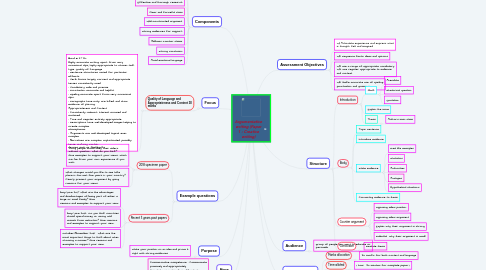
1. Components
1.1. Organization
1.2. Use of logos, pathos and ethos
1.3. Effective and thorough research
1.4. Clear and forceful claim
1.5. Well-constructed argument
1.6. Strong evidences for support
1.7. Address counter claims
1.8. Strong conclusion
1.9. Avoid emotional language
2. Focus
2.1. Quality of Language and Appropriateness and Content 30 marks
2.1.1. Band 8 27–30 Highly accurate writing, apart from very occasional slips; highly appropriate to chosen task type. Quality of Language • Sentence structures varied for particular effects. • Verb forms largely correct and appropriate tenses consistently used. • Vocabulary wide and precise. • Punctuation accurate and helpful. • Spelling accurate apart from very occasional slips. • Paragraphs have unity, are linked, and show evidence of planning. Appropriateness and Content • Consistently relevant. Interest aroused and sustained. • Tone and register entirely appropriate. • Descriptions have well-developed images helping to create complex atmospheres. • Arguments are well developed, logical, even complex. • Narratives are complex, sophisticated, possibly tense, and may contain devices such as flashbacks.
3. Purpose
3.1. State your position on an idea and prove it right with strong evidences
4. Example questions
4.1. 2018 specimen paper
4.1.1. Young people should obey their elders without question.’ What do you think? Give examples to support your views, which can be from your own experience if you wish.
4.1.2. What changes would you like to see take place in the next five years in your country? Clearly present your argument by giving reasons for your views.
4.2. Recent 3 years past papers
4.2.1. May/June 2017 What are the advantages and disadvantages of being part of either a large or small family? Give reasons and examples to support your view.
4.2.2. May/June 2016 Do you think countries should spend money on saving wild animals from extinction? Give reasons and examples to support your view.
4.2.3. October/November 2015 What are the most important things to think about when choosing a career? Give reasons and examples to support your view.
5. Aims
5.1. Communicative competence : Communicate precisely and appropriately Creativity : Develop ideas effectively Cross-cultural awareness : Reflect on the familiar
6. Assessment Objectives
6.1. W1 Articulate experience and express what is thought, felt and imagined
6.2. W2 Sequence facts, ideas and opinions
6.3. W3 Use a range of appropriate vocabulary W4 Use register appropriate to audience and context
6.4. W5 Make accurate use of spelling, punctuation and grammar.
7. Structure
7.1. Introduction
7.1.1. Hook
7.1.1.1. Anecdote
7.1.1.2. Rhetorical question
7.1.1.3. Quotation
7.1.2. Explain the issue
7.1.3. Thesis
7.1.3.1. Author's main claim
7.2. Body
7.2.1. Topic sentence
7.2.2. Introduce evidence
7.2.3. State evidence
7.2.3.1. Real life examples
7.2.3.2. Statistics
7.2.3.3. Authorities
7.2.3.4. Analogies
7.2.3.5. Hypothetical situations
7.2.4. Connecting evidence to thesis
7.3. Counter argument
7.3.1. Opposing side's position
7.3.2. Opposing side's argument
7.3.3. Explain why their argument is strong
7.3.4. Rebuttal- why their argument is weak
7.4. Conclusion
7.4.1. Restate thesis
8. Audience
8.1. group of people you want to educate or persuade.
9. Key information
9.1. Marks allocation
9.1.1. 30 marks for both content and language
9.2. Time alloted
9.2.1. 1 hour 30 minutes for complete paper 1
9.3. Weightage
9.3.1. 25%
9.4. Length of essay
9.4.1. 350 to 500 words

